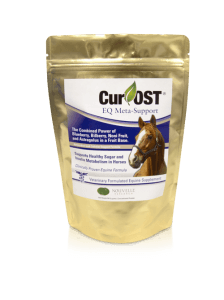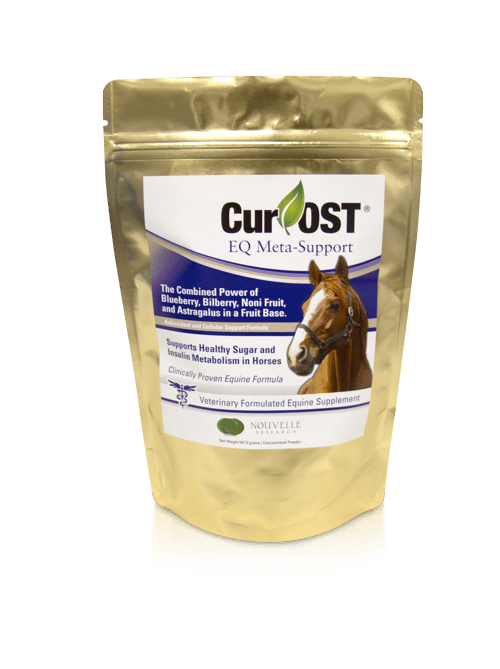Introduction:
Metabolic syndrome is a term used referring to a group of risk factors that contribute to an increased risk of heart disease, diabetes and stroke in people. In horses, metabolic syndrome is closely connected with poor sugar metabolism, insulin dysfunction, circulatory disease and laminitis. In both groups, the risk factor that is most prominent is obestity or excessive body condition, which then tends to increase the risk for development of other factors and further contribute to patient health deterioration.

In humans, the 5 major risk factors to the development of metabolic syndrome include; a large waistline, high triglycerides, low LDL cholesterol, high blood pressure and high fasting blood sugar. In horses, the main contributing factor is an overweight body condition and often insulin dysfunction. Despite pharmaceutical interventions in both people and horses, there is still a lack of control and management of the syndrome. The intake of proper nutrients, combined with a healthy diet and lifestyle have been shown to be the best preventative and potential management measures.
Modern research has demonstrated that all metabolic disease are associated with a low level (chronic) inflammation, oxidative stress and endoplasmic reticulum stress. It has also been shown that more often than not, these stresses interact with one another and intensify over the course of disease development. Considering this, therapeutic options that can reduce these stresses are emerging as targets for intervention and management of metabolic diseases.1
Many citrus fruits, berries, mushrooms and other herbs have demonstrated the ability in research to reduce the clinical manifestations associated with metabolic syndrome by modifying chronic inflammation and oxidative stress damage. In most cases, these herbs are capable of reducing inflammation by downregulating NF-kB, a transcription factor involved in the production of inflammatory proteins. They can also assist with reducing oxidative stress through their innate antioxidant capabilties and through upregulation of NRF2, which assists in regulating antioxidant response at a cellular level.
Purpose of the Study:
In this study, we plan to evaluate the clinical response of a propietary herbal formula, consisting of a 4:1 concentrated extact of Blueberry, Bilberry and Noni Fruit, with apple peel, Poria cocos, Astragalus and Amla extracts, (Cur-OST® EQ Meta-Support) in horses with metabolic syndrome. The overall goal was to investigate palatability, impact on weight and body condition, and improvement in foot soreness score over a 30 day period of time.
Patient Selection:
Thirteen (13) equine patients were selected based on overweight body condition score and prior diagnosis of metabolic syndrome. Ten patients demonstrated foot soreness, attributed to laminitis, while 3 did not have any evident problems aside from an overweight body condition. Patient diets, exercise levels and supplement or medication regimens were held constant, not being altered during the research trial. Insulin levels were not followed in the research trial.
Results:
| Patient | Initial Weight | Post Weight | Total Weight Loss | Foot Soreness Improved |
| 1 | 1898 lbs | 1940 lbs | None | No change |
| 2 | 961 lbs. | 980 lbs. | None | No change |
| 3 | 1194 lbs. | 1130 lbs. | 60lbs. | No change |
| 4 | 1255 lbs. | 1190 lbs. | 65 lbs. | Improved |
| 5 | 1500 lbs. | 1470 lbs. | 30 lbs. | No foot soreness |
| 6 | 1370 lbs. | 1320 lbs. | 50 lbs. | No change |
| 7 | 1286 lbs. | 1246 lbs. | 40 lbs. | Improved |
| 8 | 932 lbs. | 900 lbs. | 32 lbs. | Improved |
| 9 | 1158 lbs. | 1150 lbs. | 8 lbs. | Improved |
| 10 | 1220 lbs | 1168 lbs | 52 lbs. | No foot soreness |
| 11 | 1890 lbs | 1852 lbs. | 38 lbs. | Improved |
| 12 | 1270 lbs | 1235 lbs. | 35 lbs. | Improved |
| 13 | 1176 lbs. | 1146 lbs. | 30 lbs. | Improved |
Discussion:
A healthy diet and lifestyle can greatly impact the development and progression of metabolic syndrome related health diseases. In most instances, proper foods, can not only provide nutrients to support cellular support, but also impart a direct antioxidant capability to reduces oxidative cellular damage and impact chronic inflammation. Considering this, a healthy diet, utilzing proven food sources could prove valuable in management of metabolic syndrome in many aspects, including assisting in maintaining a healthier body weight, which in and of itself, can positively impact inflammation and health.
Blueberries, bilberries, noni and other berry fruits have been demonstrated to impact health positively through many properties. They have been shown to protect against oxidative stress due to high level of antioxidant potential and flavanoids, improve cardiovascular health, reduce blood pressure, reduce LDL cholesterol, reduce adipose (fat) tissue inflammation, protect against insulin resistance, improve insulin sensitivity, reduce pancreatic cell apoptosis, promote proliferation of β-cells, improve glucose metabolism and have also demonstrated anti-cancer properties via reduction of inflammation via NF-kB and JNK pathways.2,3,4,5,6,7
Apple peel is another of great interest, rich in antioxidants, polyphenols and quercetin. In studies, apple peel has demonstrated anti-inflammatory properties, inhibiting H. pylori associated with stomach ulcers, anti-proliferative properties against cancer cells, inhibits tumor promoted carcinogenesis, impact markers of metabolic syndrome including glucose, LDL cholesterol, and improve insulin sensivity.8,9,10,11,12
Poria cocos is a mushroom with tremendous medicinal capabilities. It has been demonstrated to significantly improve hyperlipidemia, improve glucose metabolism, reduce inflammation, protect the brain and other organs from beta-amyloid deposition and growth inhibitory effects against various forms of cancer.13,14,15,16,17
Astragalus membranaceus is an herb used in traditional chinese medicine for centuries and has demonstrated remarkable abilities in research. Astragalus has been shown to decrease fasting glucose, hemoglobin A1-C, insulin levels, improves memory impairment, anti-inflammatory benefits, reduces toxicity of immunosuppressants and chemotherapy, immunomodulatory, antioxidant, anti-cancer properties, reduces iron-toxicity and is nephroprotective protecting kidney function.
In this research trial, 11 out of 13 horses demonstrated evident weight loss, with an average of 33.8 lbs lost over a 30 day period of time with once daily administration of the research proprietary blend. Two of the patients demonstrated weight gain, which is hard to determine cause, which may be dietary related. In regards to foot soreness, likely attributed to chronic laminar inflammation, 7 out of 13 demonstrated improvements in lameness perception, 2 had no soreness at the start of the trial and 4 horses did not demonstrate clinical improvement in this area.
Overall, the supplement was well tolerated and accepted by all patients.
Conclusion:
Metabolic syndrome in horses is relatively similar to the same condition in humans. An overweight body condition is often a hallmark sign of metabolic syndrome and itself contributes to an elevated inflammatory status in that patient, potentially giving rise to further health problems. Diet can play a major role potentially in helping to manage clinical problems and the findings of our study indicate that the supplementation of berries, fruits and even medicinal mushrooms may prove of benefit in helping to promote a healthy weight, which then may improve not only quality of life for the patient, but improve insulin sensitivity and inflammatory markers.
References:
- Son, Y et al. Therapeutic Roles of Heme-Oxygenase-1 in Metabolic Diseases: Curcumin and Resveratrol Analogues as Possible Inducers of Heme Oxygenase-1. Ox Cell Long, 2013, article 639541.
- Basu, A et al. Blueberries decrease cardiovascular risk factors in obese men and women with metabolic syndrome. J Nutr, 2010. 140: 1582-87
- Babu, Pu et al. Recent advances in understanding the anti-diabetic actions of dietary flavanoids. J Nutr Biochem. 2013. 24(11):1777-89
- Gordillo, G et al. Oral administration of blueberry inhibits angiogenic tumor growth and enhances survial of mice with endothelial cell neoplasm. Antiox Cell Sign. 2009. 11(1), 47-58
- Ahmet, I et al. Survival and carioprotective benefits of long term blueberry enriched diet in dilated cariomyopathy following myocardial infarction in rats. Plus One. 2009. 4(11): 1-7
- Defuria, J et al. Dietary blueberry attenuates whole body insulin resistance in high fat fed mice by reducing adipocyte death and its inflammatory sequelae. J Nutr. 2009. 139:1510-16
- Stull, A et al. Bioactives in blueberries improve insulin sensitivity in obese, insulin resistant men and women. J Nutr. 2010. 140:1764-68
- Gonzalez, J et al. Apple peel supplemented diet reduces signs of metabolic syndrome and atherogenic progression in ApoE-/- mice. Ev Base Comp Med. 2015, article 918384.
- Pastene, E et al. In vitro and in-vivo effects of apple peel polyphenols against H. pylori. J Aric Food Chem. 2010. Jun 23:58(12), 7172-9.
- Regan-Shaw, S et al. Anti-proliferative effects of apple peel extract against cancer cells. Nutr Cancer. 2010, 62(4):517-24
- Ding, M et al. Inhibition of AP-1 and neoplastic transformation by fresh apple peel extract. J Biol Chem. 2004, Mar 12:279(11), 10670-6.
- Denis, M et al. Apple peel polyphenols and their beneficial actions on oxidative stress and inflammation. Plos One, 2013: 8(1).
- Li, Tzu-Hsuan et al. Anti-hyperglycemic properties of crude extract and triterpenes from Poria cocos. Ev Base Comp Med. 2011, article 128402.
- Miao, H et al. Lipidomics biomarkers of diet-induced hyperlipidemia and its treatment with Poria cocos. J Argic Food Chem. 2016. Feb 3: 64(4), 959-79.
- Jeong, JW et al. Ethanol extract of Poria cocos reduces the production of inflammatory mediators by supressing the NF-kB signaling pathway in lipid stimulated macrophages. BMC Compl Alt Med. 2014, Mar 15 (14):101
- Park, YH. Poria cocos water extract protects PC12 neuronal cells from beta-amyloid induced cell death through antioxidant and antiapoptotic functions. Pharmazie. 2009, Nov, 64(11), 760-4.
- Zhang, M et al. Growth inhibitory effects of a beta-glucan from the mycellium of Poria cocos on human breast carcinoma MCF-7 cells: cell cycle arrest and apoptosis function. Oncol Rep. 2006. Mar, 15(3), 637-43.
- Dun, C et al. Effects of Astragalus polysaccharides on memory impairment in a diabetic rat model. Neuro Dis Treat. 2016. July 1:12, 1617-21.
- Wang, Y et al. Astragalus saponins inhibits LPS induced inflammation in mouse macrophages. Am J Chin Med. 2016. 44(3), 579-93.
- Auyeung, KK et al. Astragalus membranaceus: A review of its protection against inflammation and gastrointestinal cancers. Am J Chin Med. 2016. 44(1), 1-22.
- Ren, F et al. Astragalus polysaccharide upregulates hepcidin and reduces iron overload in mice via activation of P38 mitogen activated protein kinase. Biochem Biophys Res Comm. 2016. Mar 25, 472(1), 163-8.
- Zhang, HW et al. Astragalus for treating chronic kidney disease. Cochrane Database. 2014, Oct 22:(10).


